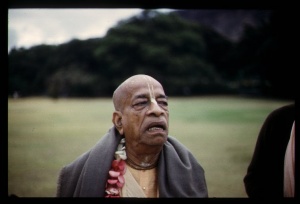SB 10.71.5: Difference between revisions
m (1 revision(s)) |
No edit summary |
||
| Line 1: | Line 1: | ||
{{info | {{info | ||
|speaker=Uddhava | |speaker=Uddhava | ||
|listener=Lord | |listener=Lord Kṛṣṇa the Supreme Personality of Godhead | ||
}} | }} | ||
[[Category:Srimad-Bhagavatam - Canto 10 Chapter 71|s05]] | |||
[[Category:Bhagavatam Verses Spoken by Uddhava - Vanisource|107105]] | |||
<div style="float:left">'''[[Srimad-Bhagavatam]] - [[SB 10|Tenth Canto]] - [[SB 10.71: The Lord Travels to Indraprastha|Chapter 71: The Lord Travels to Indraprastha]]'''</div> | |||
<div style="float:right">[[File:Go-previous.png|link=SB 10.71.4]] '''[[SB 10.71.4]] - [[SB 10.71.6]]''' [[File:Go-next.png|link=SB 10.71.6]]</div> | |||
{{RandomImage}} | |||
{{SBnotice}} | |||
==== TEXT 5 ==== | ==== TEXT 5 ==== | ||
<div | <div class="verse"> | ||
sa vai durviṣaho rājā | :sa vai durviṣaho rājā | ||
nāgāyuta-samo bale | :nāgāyuta-samo bale | ||
balinām api cānyeṣāṁ | :balinām api cānyeṣāṁ | ||
bhīmaṁ sama-balaṁ vinā | :bhīmaṁ sama-balaṁ vinā | ||
</div> | </div> | ||
| Line 17: | Line 22: | ||
==== SYNONYMS ==== | ==== SYNONYMS ==== | ||
<div | <div class="synonyms"> | ||
''saḥ''—he, Jarāsandha; ''vai''—indeed; ''durviṣahaḥ''—invincible; ''rājā''—king; ''nāga''—elephants; ''ayuta''—to ten thousand; ''samaḥ''—equal; ''bale''—in strength; ''balinām''—among powerful men; ''api''—indeed; ''ca''—and; ''anyeṣām''—others; ''bhīmam''—Bhīma; ''sama-balam''—equal in strength; ''vinā''—except for. | |||
</div> | </div> | ||
{{SBcollapse}} | |||
==== TRANSLATION ==== | ==== TRANSLATION ==== | ||
<div | <div class="translation"> | ||
The invincible King Jarāsandha is as strong as ten thousand elephants. Indeed, other powerful warriors cannot defeat him. Only Bhīma is equal to him in strength. | The invincible King Jarāsandha is as strong as ten thousand elephants. Indeed, other powerful warriors cannot defeat him. Only Bhīma is equal to him in strength. | ||
</div> | </div> | ||
| Line 31: | Line 36: | ||
==== PURPORT ==== | ==== PURPORT ==== | ||
<div | <div class="purport"> | ||
Śrīdhara Svāmī explains that the Yādavas were extremely eager to kill Jarāsandha, and thus to caution them Śrī Uddhava spoke this verse. Jarāsandha's death could come only at the hand of Bhīma. Śrīla Viśvanātha Cakravartī adds that Uddhava had previously deduced this from the Jyotīr-rāga and other astrological scriptures he had learned from his teacher Bṛhaspati. | Śrīdhara Svāmī explains that the Yādavas were extremely eager to kill Jarāsandha, and thus to caution them Śrī Uddhava spoke this verse. Jarāsandha's death could come only at the hand of Bhīma. Śrīla Viśvanātha Cakravartī adds that Uddhava had previously deduced this from the ''Jyotīr-rāga'' and other astrological scriptures he had learned from his teacher Bṛhaspati. | ||
</div> | </div> | ||
__NOTOC__ | </div> | ||
</div> | |||
<div style="float:right">[[File:Go-previous.png|link=SB 10.71.4]] '''[[SB 10.71.4]] - [[SB 10.71.6]]''' [[File:Go-next.png|link=SB 10.71.6]]</div> | |||
__NOTOC__ | |||
__NOEDITSECTION__ | |||
Revision as of 04:52, 26 May 2021

A.C. Bhaktivedanta Swami Prabhupada
Please note: The synonyms, translation and purport of this verse were composed by disciples of Śrīla Prabhupāda
TEXT 5
- sa vai durviṣaho rājā
- nāgāyuta-samo bale
- balinām api cānyeṣāṁ
- bhīmaṁ sama-balaṁ vinā
SYNONYMS
saḥ—he, Jarāsandha; vai—indeed; durviṣahaḥ—invincible; rājā—king; nāga—elephants; ayuta—to ten thousand; samaḥ—equal; bale—in strength; balinām—among powerful men; api—indeed; ca—and; anyeṣām—others; bhīmam—Bhīma; sama-balam—equal in strength; vinā—except for.
Translation and purport composed by disciples of Śrīla Prabhupāda
TRANSLATION
The invincible King Jarāsandha is as strong as ten thousand elephants. Indeed, other powerful warriors cannot defeat him. Only Bhīma is equal to him in strength.
PURPORT
Śrīdhara Svāmī explains that the Yādavas were extremely eager to kill Jarāsandha, and thus to caution them Śrī Uddhava spoke this verse. Jarāsandha's death could come only at the hand of Bhīma. Śrīla Viśvanātha Cakravartī adds that Uddhava had previously deduced this from the Jyotīr-rāga and other astrological scriptures he had learned from his teacher Bṛhaspati.